Featured on Homepage

Nebraska ChitChat Meet Up
In-Person - Lincoln, NE - Saturday, July 19 - 10:00am-12:00pm...

South & North Carolina Zoom ChitChat
Zoom - Thursday, June 12, 2024 - 7:00 PM Eastern...

New York/Connecticut ChitChat Meet Up
In-Person - Danbury, CT - Thursday, June 12 - 10:00am-12:00pm...

Haylie’s Healing Journey: A Story of Strength and Resilience
The key to treatment was aggressive intervention. But finding the right doctors was a battle. Most practitioners were unaware of PANS or didn’t believe in its severity. We were lucky to get a...

Louisiana PANS PANDAS Updates
Louisiana PANS PANDAS Action The Louisiana PANS PANDAS Action Committee (LPPA) is a newly formed group that is leading the charge for legislative change in the state to support those...

PANS & Eating Disorder/Food Restrictions & Toolkits/Handouts
PANS PANDAS & Eating Disorders/Food Restrictions – Full Packet of Recent studies and Flyer. Please note that the Flyer is also available in two poster sizes...





